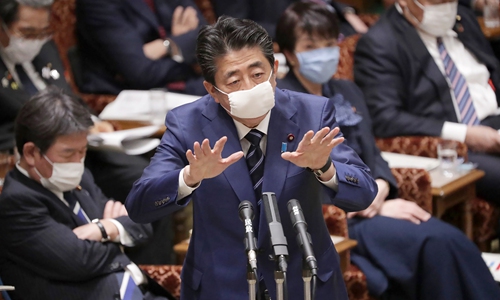Japan ends nationwide state of emergency, eyes fresh $930b stimulus
By Reuters Source:Reuters - AFP Published: 2020/5/25 18:53:40
Japan Prime Minister Shinzo Abe on Monday lifted the state of emergency imposed nationally to combat coronavirus following a sharp decline in the number of new cases.

"We had very stringent criteria for lifting the state of emergency. We have judged that we have met this criteria," Abe told a nationally televised news conference. "Today we will lift the state of emergency nationwide," he said.
Earlier on Monday, Nikkei reported a plan for new stimulus worth almost $1 trillion to help companies ride out the coronavirus pandemic.
Social distancing curbs were loosened for most of the country on May 14 as new infections fell, but the government had kept Tokyo and four other prefectures under watch.
Japan's economy minister said on Monday the government had received approval from key advisers to remove the state of emergency for all remaining regions. This is the first time the country has been completely free from the state of emergency since it was first declared a month and a half ago.
"While the emergency state will be lifted, it is important to expand economic activity in stages as we establish a new way of living," Yasutoshi Nishimura said. He added that the head of the advisory panel had recommended close monitoring of Tokyo, Kanagawa and Hokkaido prefectures, where cases had fluctuated.
The world's third-largest economy has escaped an explosive outbreak with some 17,000 infections and 825 deaths so far; however, the epidemic has tipped it into a recession and plunged Abe's popularity to multiyear lows.
An Asahi newspaper poll conducted at the weekend showed Abe's support rate at 29 percent - the lowest since he returned to power in late 2012 - and disapproval at 52 percent. The results mirrored a Mainichi newspaper survey published on Saturday.
Tokyo Governor Yuriko Koike has previously said the capital would move into "stage one" of loosening restrictions, once the state of emergency was removed.
That would allow libraries and museums to reopen, and restaurants to stay open until later in the evening. Subsequent stages would see theaters, cinemas and fairgrounds reopen.
To support an economy on track for its deepest slump in postwar history, the government is considering fresh stimulus worth 100 trillion yen ($930 billion), mostly comprising financial aid for companies, the Nikkei newspaper said.
The package, to be funded by a second supplementary budget, would follow a record 117 trillion yen spending plan deployed in April.
The combined stimulus would bring the total spending in response to the pandemic to about 40 percent of Japan's gross domestic product.
Newspaper headline: Japan ends national state of emergency, eyes fresh $930b stimulus

Japanese Prime Minister Shinzo Abe, wearing a face mask amid concerns over the spread of COVID-19, attends an upper house committee meeting at the parliament in Tokyo on Wednesday. Photo: AFP
"We had very stringent criteria for lifting the state of emergency. We have judged that we have met this criteria," Abe told a nationally televised news conference. "Today we will lift the state of emergency nationwide," he said.
Earlier on Monday, Nikkei reported a plan for new stimulus worth almost $1 trillion to help companies ride out the coronavirus pandemic.
Social distancing curbs were loosened for most of the country on May 14 as new infections fell, but the government had kept Tokyo and four other prefectures under watch.
Japan's economy minister said on Monday the government had received approval from key advisers to remove the state of emergency for all remaining regions. This is the first time the country has been completely free from the state of emergency since it was first declared a month and a half ago.
"While the emergency state will be lifted, it is important to expand economic activity in stages as we establish a new way of living," Yasutoshi Nishimura said. He added that the head of the advisory panel had recommended close monitoring of Tokyo, Kanagawa and Hokkaido prefectures, where cases had fluctuated.
The world's third-largest economy has escaped an explosive outbreak with some 17,000 infections and 825 deaths so far; however, the epidemic has tipped it into a recession and plunged Abe's popularity to multiyear lows.
An Asahi newspaper poll conducted at the weekend showed Abe's support rate at 29 percent - the lowest since he returned to power in late 2012 - and disapproval at 52 percent. The results mirrored a Mainichi newspaper survey published on Saturday.
Tokyo Governor Yuriko Koike has previously said the capital would move into "stage one" of loosening restrictions, once the state of emergency was removed.
That would allow libraries and museums to reopen, and restaurants to stay open until later in the evening. Subsequent stages would see theaters, cinemas and fairgrounds reopen.
To support an economy on track for its deepest slump in postwar history, the government is considering fresh stimulus worth 100 trillion yen ($930 billion), mostly comprising financial aid for companies, the Nikkei newspaper said.
The package, to be funded by a second supplementary budget, would follow a record 117 trillion yen spending plan deployed in April.
The combined stimulus would bring the total spending in response to the pandemic to about 40 percent of Japan's gross domestic product.
Newspaper headline: Japan ends national state of emergency, eyes fresh $930b stimulus
Posted in: ASIA-PACIFIC